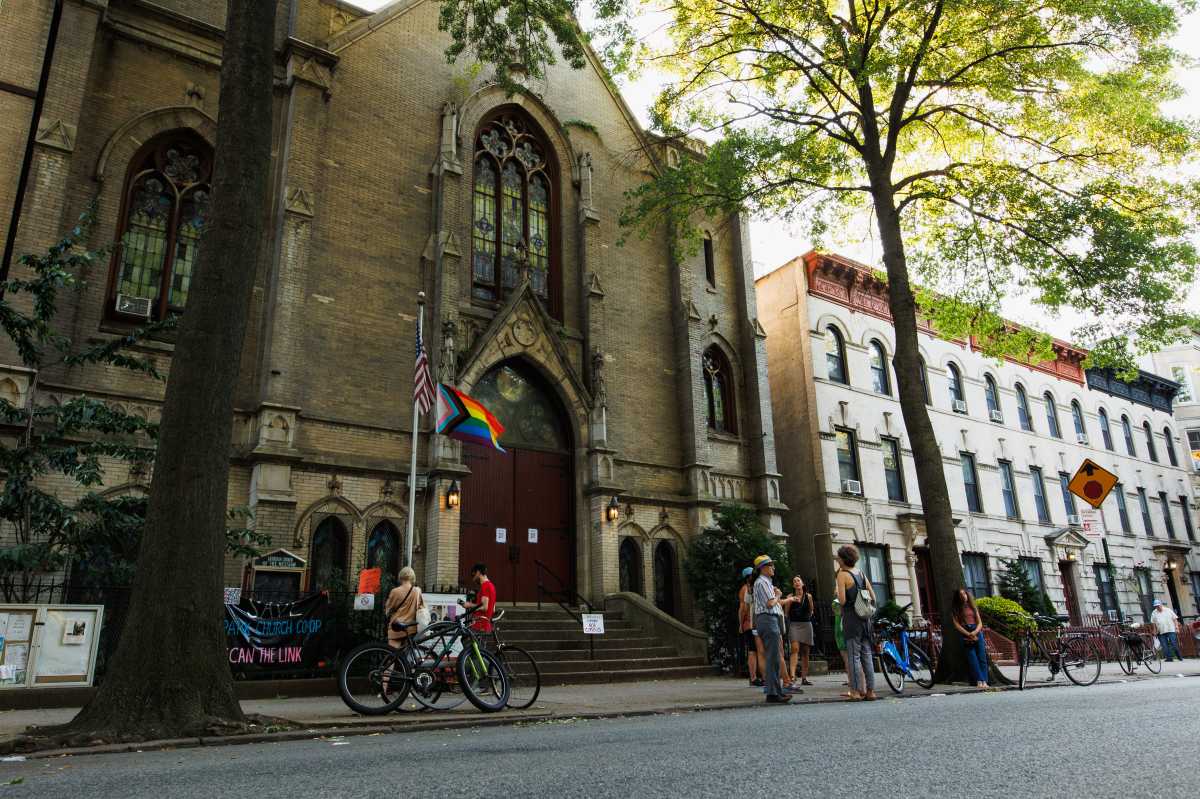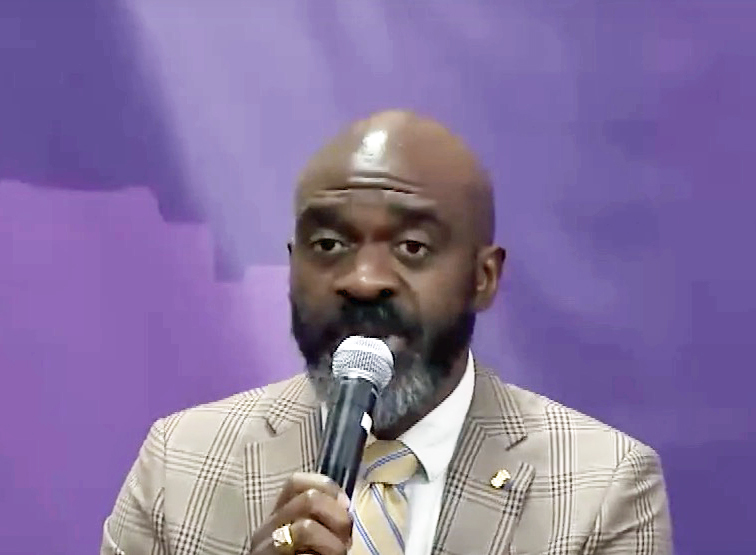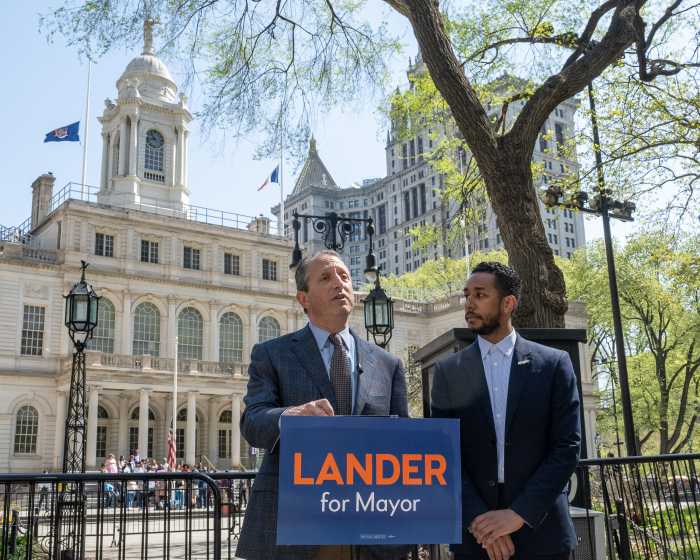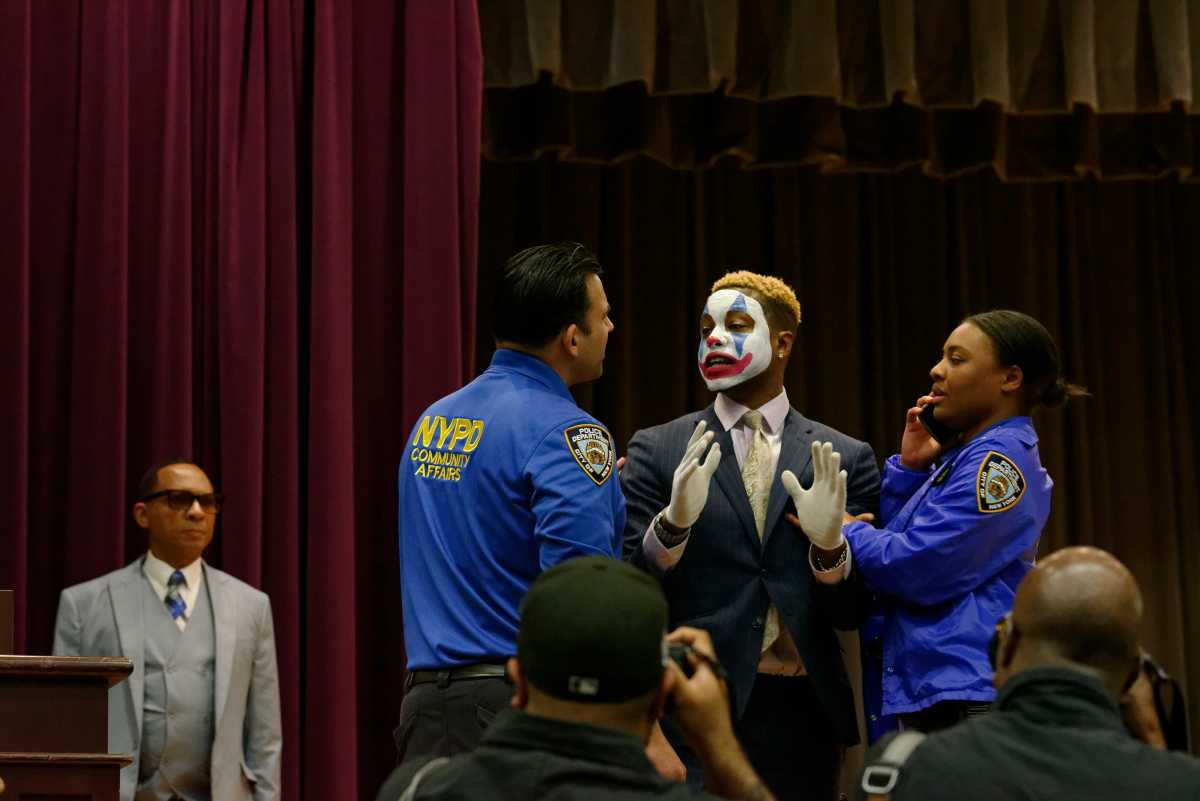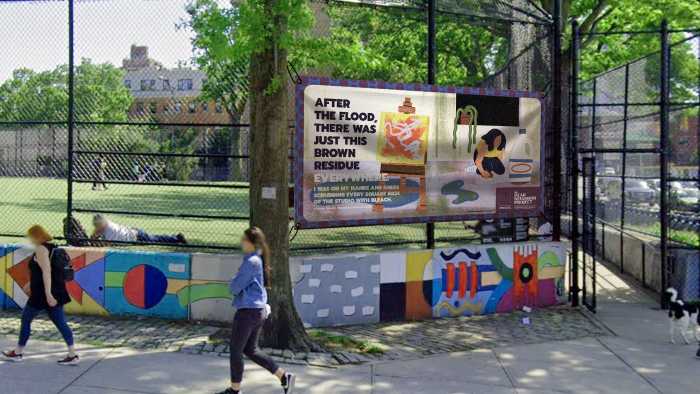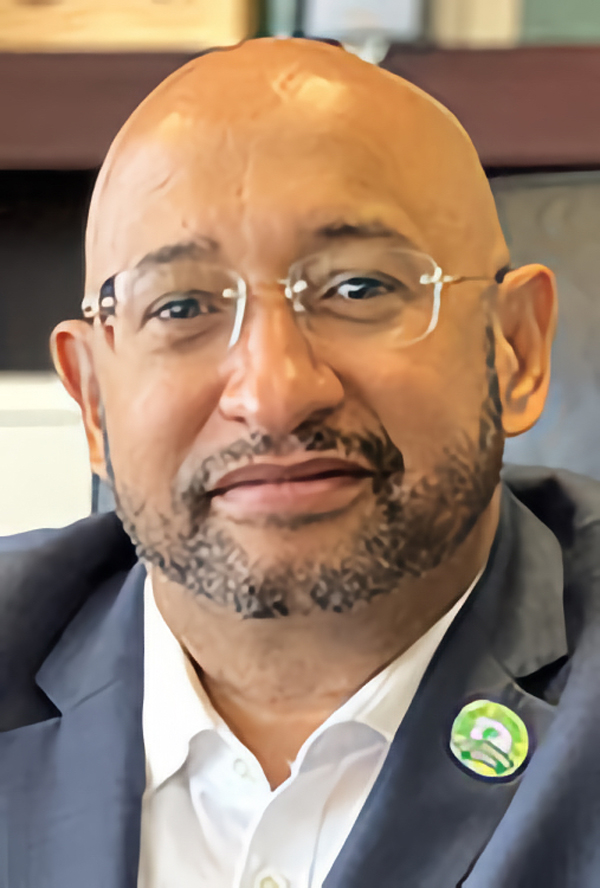Assembly Member Emily Gallagher has introduced a new bill that would tighten the rules around the sale of religious properties in New York State after Greenpointers said goodbye to both a church and the community programs it hosted.
The three-year struggle between community members and the Metropolitan New York Synod over the closure of the beloved Park Church Co-Op ended in December, when a state Supreme Court Judge allowed the Synod to sell the church to a developer.
Park Church Co-Op sold after a lengthy fight
Park Church Co-Op closed its doors in 2022, after the Synod — which oversees hundreds of Lutheran churches in New York State — pulled funding for the congregation, citing pricey structural issues and a small number of worshippers.
In the months before the church closed and in the nearly two years since, Greenpointers fought first to keep the church open, then to halt the sale in a bid to buy the building themselves.
Park Church Co-Op hosted a number of community programs in addition to religious services, including music classes, after-school programs, concerts, a soup kitchen, and a drop-in shelter. Without the church, locals said, those programs would have nowhere to go.
For some, that has proved to be true. Concetta Abbate started as a musician at Park Church in 2014, and also ran her small music school, Teacup Music, out of the church until 2022.
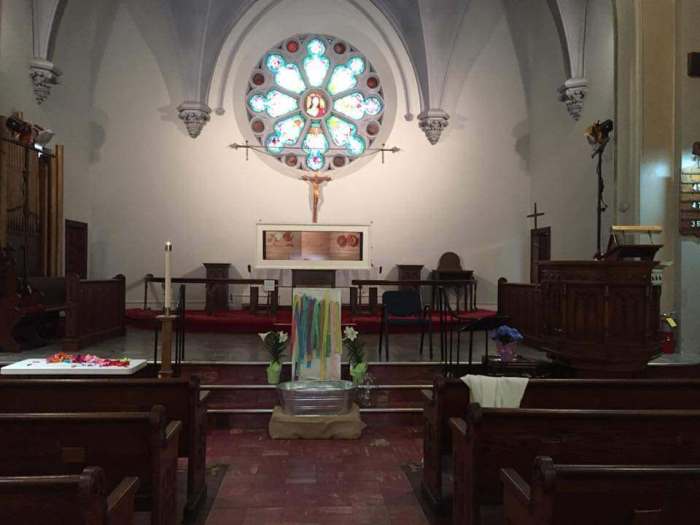
Since then, she has been teaching on Humboldt Street a block away from the church in a studio run by a friend, paying an affordable rent.
Now, that building is being sold. Abbate would only be able to afford to pay rent in Greenpoint if she launched a larger music school, she said, so she’s closing down Teacup Music and will instead teach lessons on a smaller scale in Queens.
In December, the court allowed the Synod to sell the 129 Russell St. church to developer GW Russell LLC, an offshoot of GW Equities LLC, for $4.7 million.
According to permits filed with the Department of Buildings, the developer plans to convert the church building into a three-story, ten-unit apartment building. It is not clear from the documents filed how much of the original building will remain — the permit application is for a partial demolition, and notes that not more than 50% of the gross floor area would be demolished.
Berish Wagschal, the head of GW Equities LLC, did not respond to multiple requests for comment about the sale or the future of the church building, nor did a representative for the Metropolitan New York Synod.
Starts and stops
Gallagher, who represents Williamsburg and Greenpoint in the Assembly, said she had been involved with community events at the church for years before she was elected in 2020, and knew the church had been struggling when news broke that the Synod intended to close it in 2021.
Early on, she contacted the office of Attorney General Letitia James.
Under state law, the Attorney General is required to oversee the sale of property owned by churches and other religious organizations to ensure the sale “serves the best interest of the entity and its members.”
“They were really constrained by law, because they could not consider a range of important factors,” Gallagher said. “Because in the law, all it said was about the religious corporation and the interest of the church and its members. For the church, getting a massive chunk of money was in the interest of the church as an institution.”
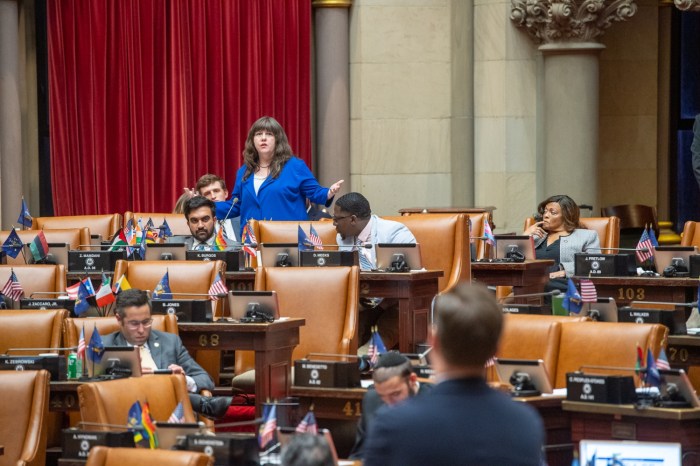
Last summer, after being asked to approve the sale, the AG’s office asked the court to hold a hearing, as the office had received “a number of complaints objecting to [the] proposed sale of the Property due to the perceived negative impact on the Greenpoint, Brooklyn community.”
The judge agreed, allowing locals to testify in support of the church. James later briefly paused the sale, and a group of locals worked to put together their own bid on the property. They received a number of pledges to support their proposed nonprofit, Commonplace, which would have operated the old church as a community center.
Jamie Hook, who spearheaded the Commonplace effort, said he was heartened to know that people were willing to pledge and support the cause, even if it didn’t pan out how they had hoped.
“But obviously the thing that is really critical in those situations is both time and the mechanisms to turn that pledge of support into a viable offer in the real estate market,” Hook said. “The most important thing that those efforts need is time, and that’s what the [Assembly Member’s] bill essentially offers.”
Gallagher’s new bill
The bill, A10232, would alter existing law so that religious institutions, when petitioning the Attorney General to sell their property, would have to include a list of community services the church is used for — like donation collection and distribution, shelter, childcare, and community meetings.
When considering the sale, the Attorney General would have to consider not only the impact the sale would have on the institution, but on the community.
If the AG did find that it would negatively affect the community, the bill would have them hold a public hearing and delay the sale until either locals could put together their own offer on the property or until the institution could guarantee those community services could continue.
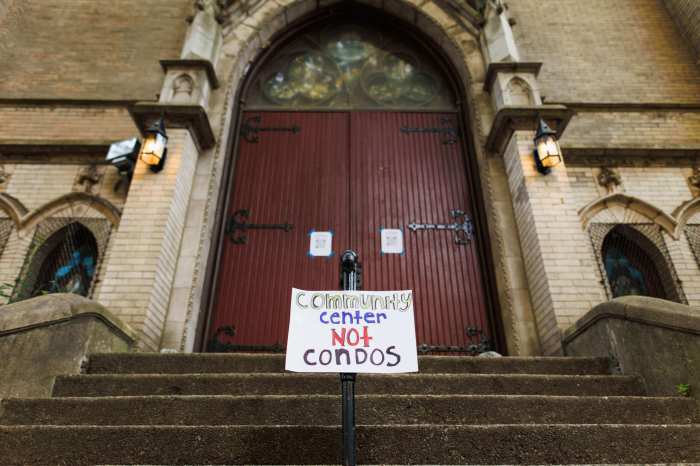
“If this new law had been there, the church and the buyer would have had to say, ‘OK, we are going to include a community space, or we’re going to work out a community space for you to use for the childcare, for the music lessons, for all of those things,’” Gallagher said.
Greenpoint, like many neighborhoods, is rapidly losing free community spaces as well as local history, the Assembly Member said. Many are only available for certain purposes, or at certain times, or need to be rented out – not used for free.
“It’s created a sad situation where we now have way more people living here than we did in the past, but we have way fewer third spaces, and we have almost no third places,” Gallagher said. “It’s a real problem when it comes to quality of life and also for community organizing.”
That includes churches, which, Hook said, often cater to a slew of community needs, like Park Church Co-Op did. But churches and other religious organizations are facing steep losses in membership across the U.S., forcing some to shutter or condense congregations and religious schools.
The loss of churches and ‘third spaces’ in New York City
Three Catholic schools in Brooklyn are closing this year, in large part due to falling enrollment and poor finances. Upstate, the Roman Catholic Diocese of Buffalo plans to close or merge as many as 50 churches.
The Metropolitan New York Synod has closed and sold a number of churches in New York City since 2019.
St. Peter’s Evangelical Lutheran Church in the Bronx which faced financial and structural issues not dissimilar to those at Park Church, closed in 2019. Parishioners told the Mott Haven Herald at the time that the church’s food pantry, which was also forced to close, was a “lifeline.”
Two years later, the Kingsbridge Evangelical Lutheran Church, also in the Bronx, was closed and sold. The Eltingville Lutheran Church and its school were demolished last year after a long stretch of financial issues.
In a 2019 lawsuit, the Eltingville Church Council claimed the Synod was illegally attempting to take over the deed to the property in order to sell, but the suit was tossed in 2020.
Abbate’s music school was one of several programs to relocate after Park Church closed. Sing LIC, which ran a children’s choir out of the space, moved back to Queens. Eckford Street Studio found a new home at Greenpoint Reformed Church across the neighborhood. The drop-in shelter is no more, and the free concerts on the church steps have gone away.
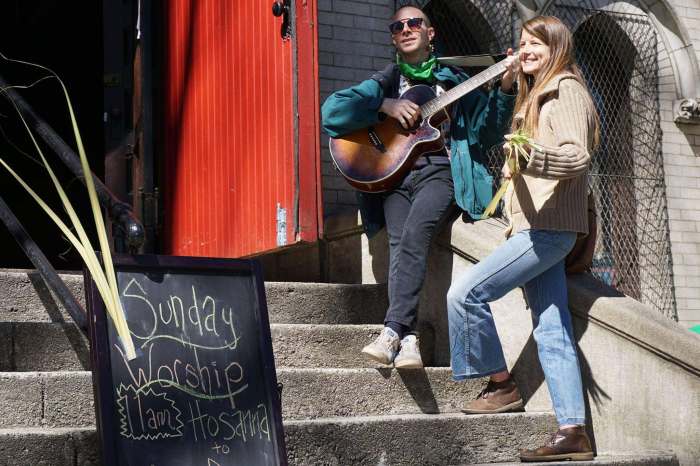
“I would say mostly things are just not happening anymore,” Abbate said. “The congregation has dispersed … it did basically dissipate, like the core community that was there. Space is really important, physical space is very important.”
Gallagher recognized that in some cases, the church may be in dire need of money. Some local houses of worship have changed their modes of operation, she said, and lease out their spaces at a low cost to make some extra money.
The state is not able to give churches money for repairs because of the separation of church and state, she said, and there is a “lingering problem” with the loss of religious identity and communities.
Hook said that though the community had not been able to save Park Church, he still saw the outpouring of support and Gallagher’s bill as a success.
“If this bill gets any traction, if it gets passed, then we will have changed the outcome for another church in the future,” he said. “It may be that churches themselves aren’t taking up this mantle with quite the vigor that they once did in the past, but that doesn’t mean the need is any lesser. And I think it’s up to us to get organized in a somewhat more secularized world to create these third spaces.”


